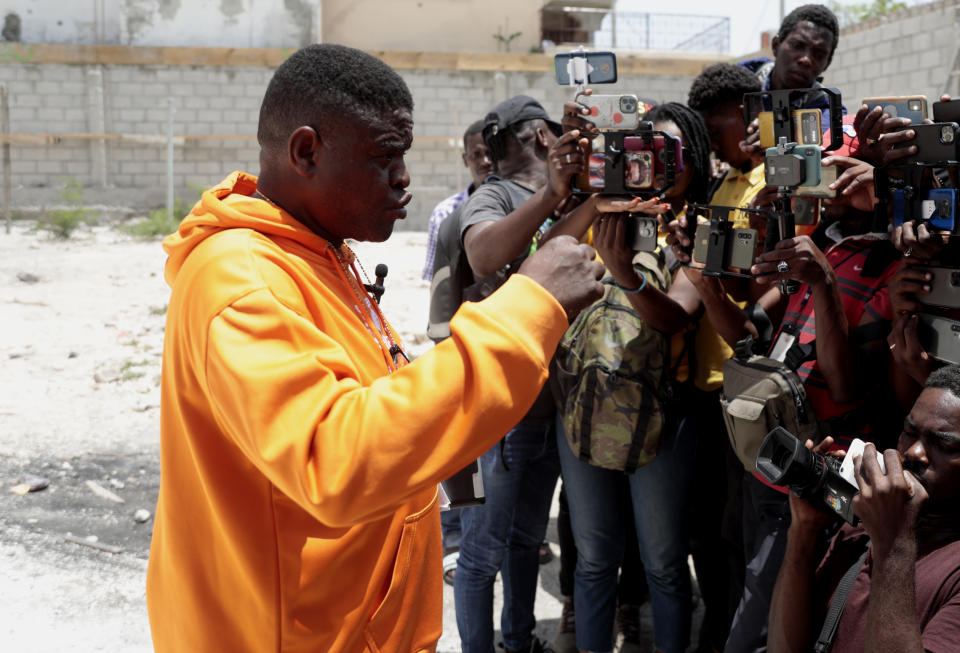Ex-Police Officer and Gang Leader Warns Against International Armed Force in Haiti
PORT-AU-PRINCE, Haiti (AP) — Jimmy Chérisier, also known as “Barbecue,” a former police officer and considered by many to be Haiti’s most powerful gang leader, issued a warning on Wednesday against any international armed force deployed to the Caribbean country if it committed any abuses. Chérisier, who leads the G9 Family and Allies gang, also called on Haitians to rise up against the government during a news conference in Port-au-Prince.
Prime Minister Ariel Henry, who has been leading Haiti since the assassination of President Jovenel Moïse in July 2021, has been advocating for the deployment of a foreign armed force to help combat the powerful gangs that now control 80% of the capital city. In late July, Kenya offered to lead a multinational force, and the United States announced earlier this month that it would propose a resolution in the U.N. Security Council to authorize a non-U.N. multinational mission.
Chérisier stated that he would welcome a foreign force if it were to arrest the prime minister and individuals he described as corrupt politicians and local police involved in the sale of ammunition and guns in Haiti’s slums. However, he warned that Haitians would rise up if any international force repeated the actions of previous U.N. peacekeepers, such as committing sexual abuses and introducing cholera into water sources.
“We will fight against them until our last breath,” Chérisier declared. “It will be a fight of the Haitian people to save the dignity of our country.”
Chérisier, who has been accused by authorities of orchestrating several massacres in recent years and organizing a fuel blockade that paralyzed Haiti for nearly two months last year, announced that his gang is no longer at war with another group known as G-Pep. He called on the Ministry of Education to reopen schools in Cite Soleil and other slums that have been closed due to the violence perpetrated by warring gangs, which has resulted in the displacement of nearly 200,000 Haitians.
During the news conference, Chérisier was surrounded by several G9 members carrying concealed handguns, a departure from previous appearances where they openly brandished assault rifles. Chérisier, the only Haitian under U.N. sanctions, has been accused by the Security Council of engaging in acts that threaten the peace, security, and stability of Haiti, as well as committing serious human rights abuses.
The United Nations declined to comment on Chérisier’s warning, according to U.N. spokesman Stephane Dujarric.

1) How does Chérisier’s warning highlight the potential pitfalls of deploying a foreign armed force in Haiti?
At the ongoing violence and instability in Haiti. However, Chérisier’s warning serves as a reminder that the presence of an international armed force may not necessarily bring about the peace and security that is desperately needed in the country.
As a former police officer turned gang leader, Chérisier holds a unique perspective on the issue. He understands the dynamics of violence and power in Haiti better than most, and his warning should not be taken lightly. Chérisier’s gang, the G9 Family and Allies, is considered to be one of the most powerful in the country, and his influence and connections make his words significant.
During his news conference in Port-au-Prince, Chérisier called on Haitians to rise up against the government. This comes at a time when the country is grappling with political uncertainty, rampant gang violence, and a severe economic crisis. Chérisier’s call for action reflects the growing frustration and anger felt by many Haitians towards their government’s inability to address these pressing issues.
While Prime Minister Ariel Henry’s proposal to deploy a foreign armed force may seem like a viable solution to some, Chérisier’s warning highlights the potential pitfalls of such a move. Haiti has a long history of foreign interventions, and many Haitians view them with skepticism and mistrust. They fear that an international armed force may commit abuses, further exacerbating the violence and chaos that plagues the country.
Instead of relying on external forces, Chérisier’s call for Haitians to rise up against the government emphasizes the need for internal solutions. It is a call for unity and collective action, as Haitians come together to demand real change and accountability from their leaders.
As Haiti continues to navigate through these challenging times, it is crucial to listen to voices like Chérisier’s. His unique perspective offers valuable insights into the complexities of the situation and serves as a reminder that sustainable solutions must come from within. Only by addressing the root causes of violence and instability can Haiti hope to achieve lasting peace and prosperity.



This is a significant warning that should not be taken lightly. It’s crucial to consider the potential consequences and find alternative strategies for stability in Haiti.